Warning: package 'tibble' was built under R version 4.5.2Warning: package 'readr' was built under R version 4.5.2Warning: package 'purrr' was built under R version 4.5.2Lecture 10
University of Arizona
INFO 511
Warning: package 'tibble' was built under R version 4.5.2Warning: package 'readr' was built under R version 4.5.2Warning: package 'purrr' was built under R version 4.5.2Data science ethics:
Misrepresentation
Data privacy
Algorithmic bias
In 2005, the Florida legislature passed the controversial “Stand Your Ground” law that broadened the situations in which citizens can use lethal force to protect themselves against perceived threats. Advocates believed that the new law would ultimately reduce crime; opponents feared an increase in the use of lethal force.
Every time we use apps, websites, and devices, our data is being collected and used or sold to others.
More importantly, decisions are made by law enforcement, financial institutions, and governments based on data that directly affect the lives of people.
What pieces of data have you left on the internet today? Think through everything you’ve logged into, clicked on, checked in, either actively or automatically, that might be tracking you. Do you know where that data is stored? Who it can be accessed by? Whether it’s shared with others?
What are you OK with sharing?
Have you ever thought about why you’re seeing an ad on Google? Google it! Try to figure out if you have ad personalization on and how your ads are personalized.
Which of the following are you OK with your browsing history to be used towards?
Suppose you create a profile on a social media site and share your personal information on your profile. Who else gets to use that data?
Some may object to the ethics of gathering and releasing this data. However, all the data found in the dataset are or were already publicly available, so releasing this dataset merely presents it in a more useful form.
Researchers Emil Kirkegaard and Julius Daugbjerg Bjerrekær
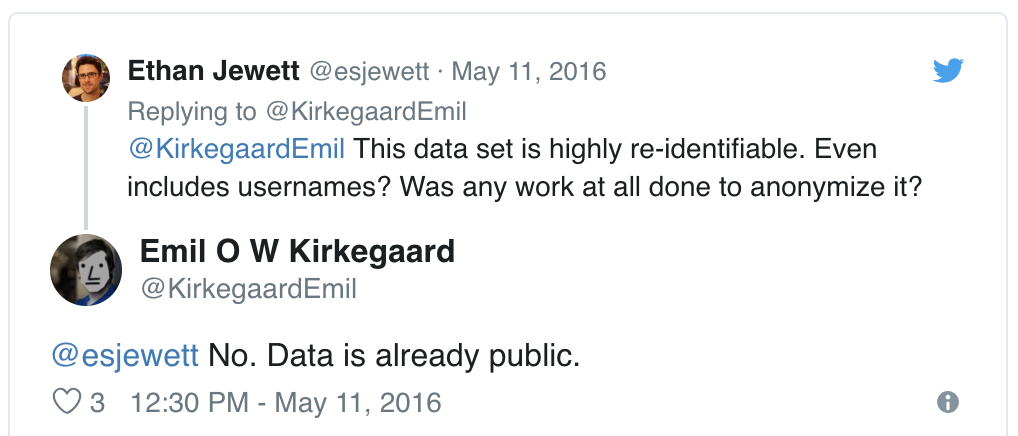
What might be the reason for Google’s gendered translation? How do ethics play into this situation?

On the Dangers of Stochastic Parrots: Can Language Models Be Too Big? 🦜 (Bender et. al., 2021)
The past 3 years of work in NLP have been characterized by the development and deployment of ever larger language models, especially for English. BERT, its variants, GPT-2/3, and others, most recently Switch-C, have pushed the boundaries of the possible both through architectural innovations and through sheer size. Using these pretrained models and the methodology of fine-tuning them for specific tasks, researchers have extended the state of the art on a wide array of tasks as measured by leaderboards on specific benchmarks for English. In this paper, we take a step back and ask: How big is too big? What are the possible risks associated with this technology and what paths are available for mitigating those risks? We provide recommendations including weighing the environmental and financial costs first, investing resources into curating and carefully documenting datasets rather than ingesting everything on the web, carrying out pre-development exercises evaluating how the planned approach fits into research and development goals and supports stakeholder values, and encouraging research directions beyond ever larger language models.
What is meant by “stochastic parrots” in the paper title?
2016 ProPublica article on algorithm used for rating a defendant’s risk of future crime:
In forecasting who would re-offend, the algorithm made mistakes with black and white defendants at roughly the same rate but in very different ways.
The formula was particularly likely to falsely flag black defendants as future criminals, wrongly labeling them this way at almost twice the rate as white defendants.
White defendants were mislabeled as low risk more often than black defendants.

What is common among the defendants who were assigned a high/low risk score for reoffending?

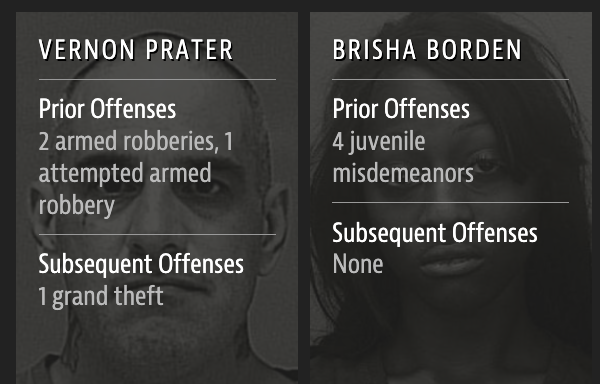
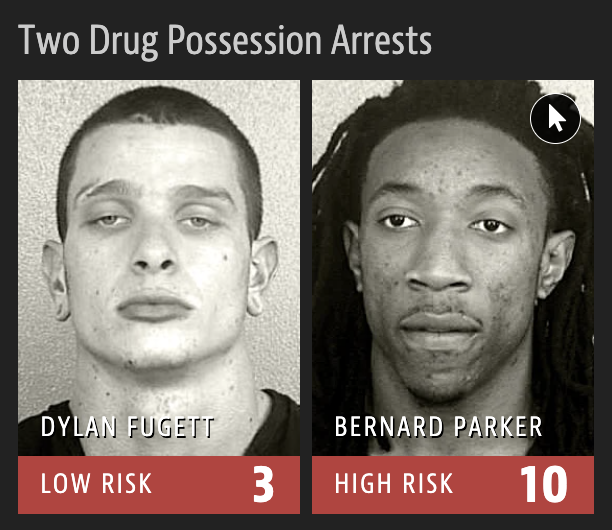
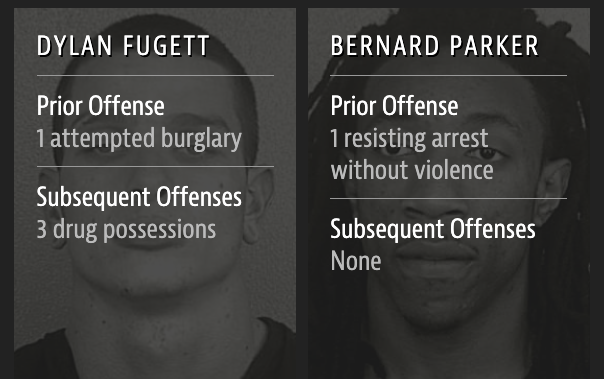
How can an algorithm that doesn’t use race as input data be racist?
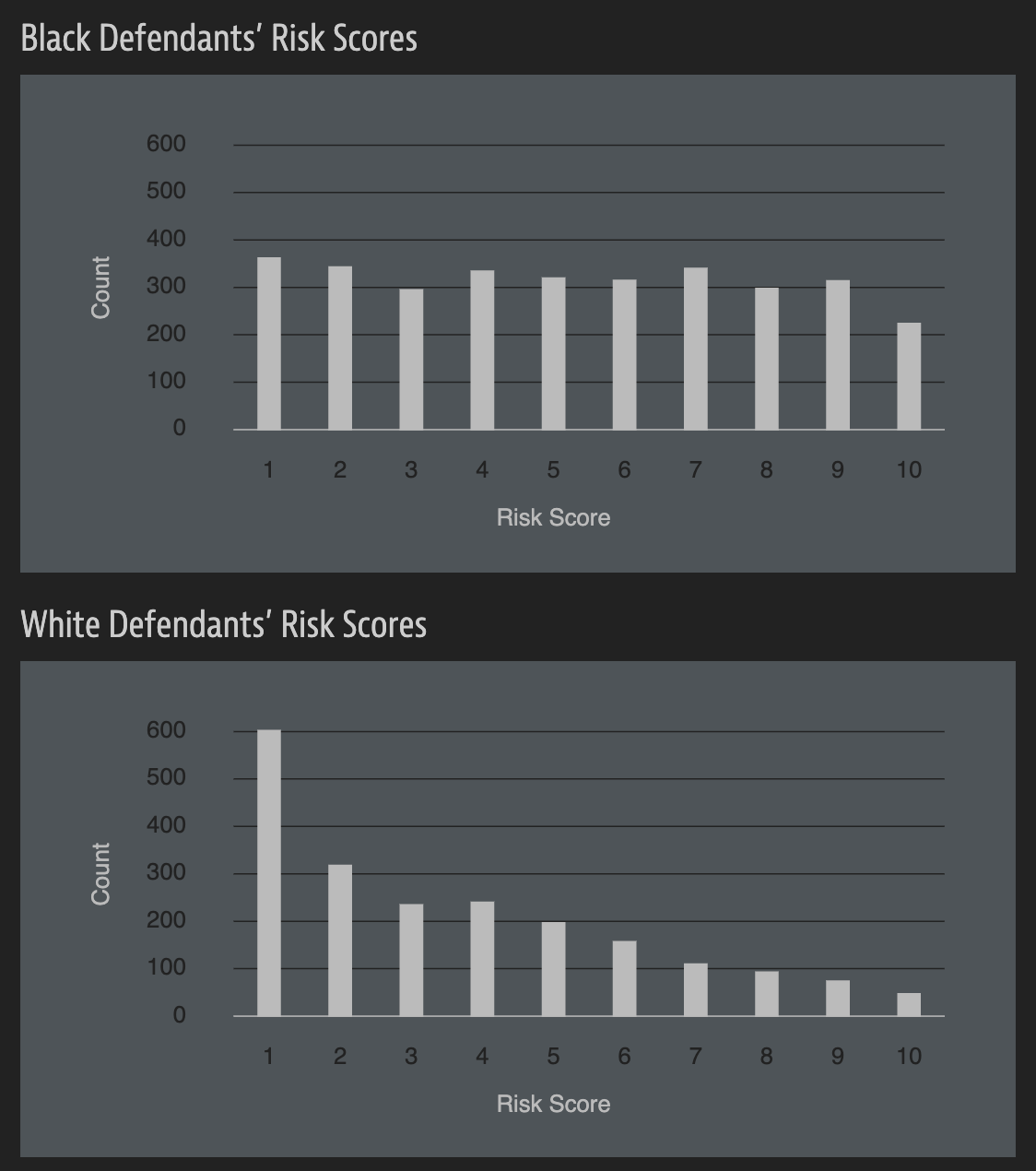
Improving Ecological Inference by Predicting Individual Ethnicity from Voter Registration Record (Imran and Khan, 2016)
In both political behavior research and voting rights litigation, turnout and vote choice for different racial groups are often inferred using aggregate election results and racial composition. Over the past several decades, many statistical methods have been proposed to address this ecological inference problem. We propose an alternative method to reduce aggregation bias by predicting individual-level ethnicity from voter registration records. Building on the existing methodological literature, we use Bayes’s rule to combine the Census Bureau’s Surname List with various information from geocoded voter registration records. We evaluate the performance of the proposed methodology using approximately nine million voter registration records from Florida, where self-reported ethnicity is available. We find that it is possible to reduce the false positive rate among Black and Latino voters to 6% and 3%, respectively, while maintaining the true positive rate above 80%. Moreover, we use our predictions to estimate turnout by race and find that our estimates yields substantially less amounts of bias and root mean squared error than standard ecological inference estimates. We provide open-source software to implement the proposed methodology. The open-source software is available for implementing the proposed methodology.
The said “source software” is the wru package: https://github.com/kosukeimai/wru.
Do you have any ethical concerns about installing this package?
Was the publication of this model ethical? Does the open-source nature of the code affect your answer? Is it ethical to use this software? Does your answer change depending on the intended use?
library(wru)
predict_race(voter.file = voters, surname.only = TRUE) |>
select(surname, contains("pred")) surname pred.whi pred.bla pred.his pred.asi pred.oth
1 Khanna 0.045110474 0.003067623 0.0068522723 0.860411906 0.084557725
2 Imai 0.052645440 0.001334812 0.0558160072 0.719376581 0.170827160
3 Rivera 0.043285692 0.008204605 0.9136195794 0.024316883 0.010573240
4 Fifield 0.895405704 0.001911388 0.0337464844 0.011079323 0.057857101
5 Zhou 0.006572555 0.001298962 0.0005388581 0.982365594 0.009224032
6 Ratkovic 0.861236727 0.008212824 0.0095395642 0.011334635 0.109676251
7 Johnson 0.543815322 0.344128607 0.0272403940 0.007405765 0.077409913
8 Lopez 0.038939877 0.004920643 0.9318797791 0.012154125 0.012105576
10 Wantchekon 0.330697188 0.194700665 0.4042849478 0.021379541 0.048937658
9 Morse 0.866360147 0.044429853 0.0246568086 0.010219712 0.054333479Predicting race for 2020Warning: Unknown or uninitialised column: `state`.Proceeding with last name predictions...ℹ All local files already up-to-date!
ℹ All local files already up-to-date! surname pred.whi pred.bla pred.his pred.asi pred.oth
1 Chism 0.579293 0.3224595 0.0271373 0.006381576 0.06472858